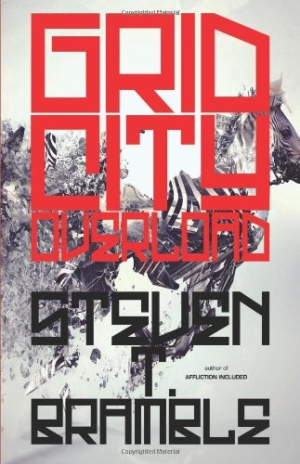
Grid City Overload
- 2012 INDIES Winner
- Honorable Mention, Literary (Adult Fiction)
Information overload. Living in 2012, we know what that’s like: smartphones, Facebook, news feeds, YouTube, and Twitter all constantly compete for our attention. As overwhelming as today’s technology-fueled society can be, Steven T. Bramble’s Grid City Overload imagines a not-too-distant future where high-tech connections completely dominate our lives. Welcome to Grid City, USA. It’s 2025, a time when subway advertisements adjust to a viewer’s gaze and LCD ceiling tiles announce the news of the world in an endless stream.
Drawing on ideas set out by journalist Alvin Toffler in his 1970 book, Future Shock, Bramble shows that the problem of “too much change in too short a period of time” has only accelerated since Toffler first described shell-shocked human beings trying to cope with rapid change. In Bramble’s vision, people have come to depend upon technology to such an extent that they are no longer able to connect on a human level. Everyone is hooked up to their machines, but can’t access each other. Indeed, each member of Bramble’s revolving cast of narrators lives alone.
Bramble lets his characters tell the story, which is equal parts fast-paced mystery and thoughtful, existential reflection. There’s Gerney, an ambivalent, distracted drug addict; Fish, a factory worker who has a text-only relationship with his girlfriend; and Amy, cold-hearted hacker extraordinaire. Add another half-dozen voices to the mix, including a sentient cell phone named Camillia, and you might expect this story, at over four hundred pages in length, to get confusing.
Bramble gives each character such a distinct perspective that it takes no time at all to adjust to each in turn. Similarly, the long, stream-of-consciousness sentences the author employs throughout could easily get convoluted and tiring. But while he piles image upon image in a clever reflection of the Grid City culture, the narrative continually offers a new perspective, a gem of a thought worth capturing.
Why was the city of Grid created, and why do people continue to live there? This is the bigger mystery that overshadows subplots of corporate espionage and attempted assassinations. Bramble makes it clear that escape is possible—the rest of the country is still out there, albeit not in great shape. He makes effective use of metaphor to compare the human experience in Grid to that of a beetle trapped between two panes of glass: “The space is narrow, the beetle navigating it vertically … crawling up and down in pathetically aimless directions in a definite frenzy, his little legs and antennae working overtime with fear. He stops, moves his head side to side like a dog sniffing out a trail before exploding off in yet another doomed direction.”
Grid City Overload is in many ways the Bright Lights, Big City of the current generation. Where Jay McInerney’s 1984 novel featured cocaine addicts looking for their next big thrill and coming up empty, Bramble’s story focuses on an entire society “oversaturated with stimuli” and trying to glean some meaning from it all.
Reviewed by
Sheila M. Trask
Disclosure: This article is not an endorsement, but a review. The publisher of this book provided free copies of the book and paid a small fee to have their book reviewed by a professional reviewer. Foreword Reviews and Clarion Reviews make no guarantee that the publisher will receive a positive review. Foreword Magazine, Inc. is disclosing this in accordance with the Federal Trade Commission’s 16 CFR, Part 255.
